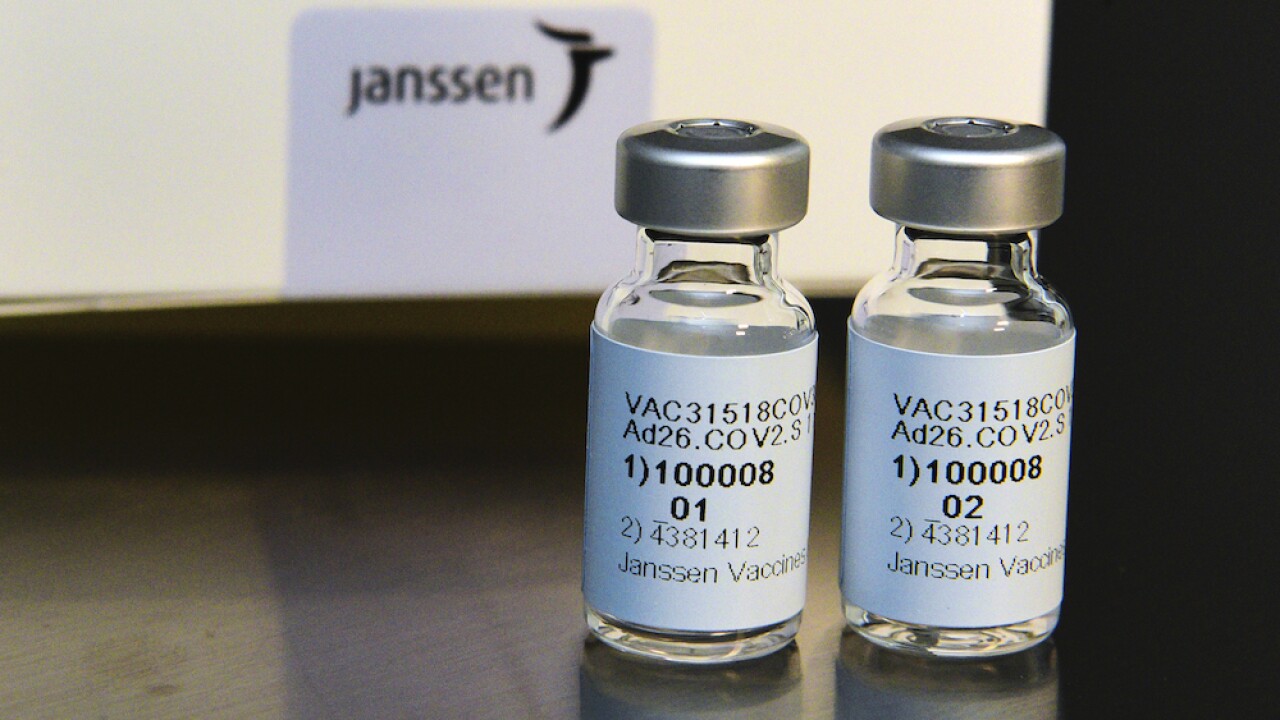RICHMOND, Va. -- Virginia is one of several states that restarted use of the one-shot Johnson & Johnson coronavirus vaccine Saturday after receiving the green light from federal health officials.
Arizona, New York, Virginia, Missouri, Michigan and Tennessee were among the other states ordering or recommending a resumption of the vaccine.
Those moves came swiftly after U.S. health officials said Friday evening they were lifting an 11-day pause on vaccinations using the J&J vaccine. During the pause, scientific advisers to the Center for Disease Control and Prevention decided the vaccine’s benefits outweigh a rare risk of blood clots.
There were 15 vaccine recipients who developed a highly unusual kind of blood clot out of nearly 8 million people given the J&J shot in the U.S. All were women, most under age 50. Three died and seven remain hospitalized.
"This pause, such as it was, should actually be reassuring to the public that... this is a sign that that safety monitoring, the safety issues, it's working," Dr. Melissa Viray, Deputy Director of the Richmond and Henrico Health Districts.
Virginia’s Vaccination Coordinator, Dr. Danny Avula, said J&J COVID-19 shots could resume in the Commonwealth as soon as this weekend.
“I think there are probably be about 30 or 40,000 doses that our providers currently have and have been, you know, in refrigeration awaiting a decision," Avula explained. "And then the pharmacies as well."
Avula said there were benefits to using the one and done J&J shot, especially for homebound, homeless, and hospitalized individuals and college students -- adding that before the pause, they were ready to do mass J&J vaccinations for college students before they left for the Summer.
The state's vaccine coordinator said safety was top of mind, and health officials would be working to make sure people are aware of the risks.
"We have messaging that's ready to go," Avula said. "Certainly, there will be public statements. But there will also be specific information that's going to providers so that they're armed with the information they need to talk through this with patients."

Officials with the Henrico County Health Department and the Chickahominy Health District said they do not have any J&J clinics scheduled this weekend, but said they are open to using the vaccine again once they receive it.
Crater Health District officials said they plan to meet Tuesday to discuss resuming distribution of the J&J shot.
But regardless of which vaccine you choose, Avula, who received a J&J shot at the mass vaccination clinic at Richmond Raceway on April 1, urged people to get vaccinated.
“The risk of experiencing that extremely rare side effect is actually way smaller than contacting COVID and potentially being hospitalized or worse,” Avula said.
Viray added that getting vaccinated is the "way out of this pandemic."
"It is the safest way for us to be able to resume a normal life," Viray said.

Virginians age 16+ now eligible for COVID-19 vaccine. Register for the COVID-19 vaccine on the Vaccinate Virginia website or call 877-VAX-IN-VA (877-275-8343). You can also search for specific vaccines as well as which ones are available near you via the Vaccine Finder website.
Have You Been Fully Vaccinated?
People are considered fully vaccinated:
- 2 weeks after their second dose in a 2-dose series, such as the Pfizer or Moderna vaccines, or
- 2 weeks after a single-dose vaccine, such as Johnson & Johnson’s Janssen vaccine

How to Protect Yourself and Others When You’ve Been Fully Vaccinated
COVID-19 vaccines are effective at protecting you from getting sick. Based on what we know about COVID-19 vaccines, people who have been fully vaccinated can start to do some things that they had stopped doing because of the pandemic.
We’re still learning how vaccines will affect the spread of COVID-19. After you’ve been fully vaccinated against COVID-19, you should keep taking precautions—like wearing a mask, staying 6 feet apart from others, and avoiding crowds and poorly ventilated spaces—in public places until we know more.
These recommendations can help you make decisions about daily activities after you are fully vaccinated. They are not intended for healthcare settings.
Click here for more information from the Virginia Department of Health.




